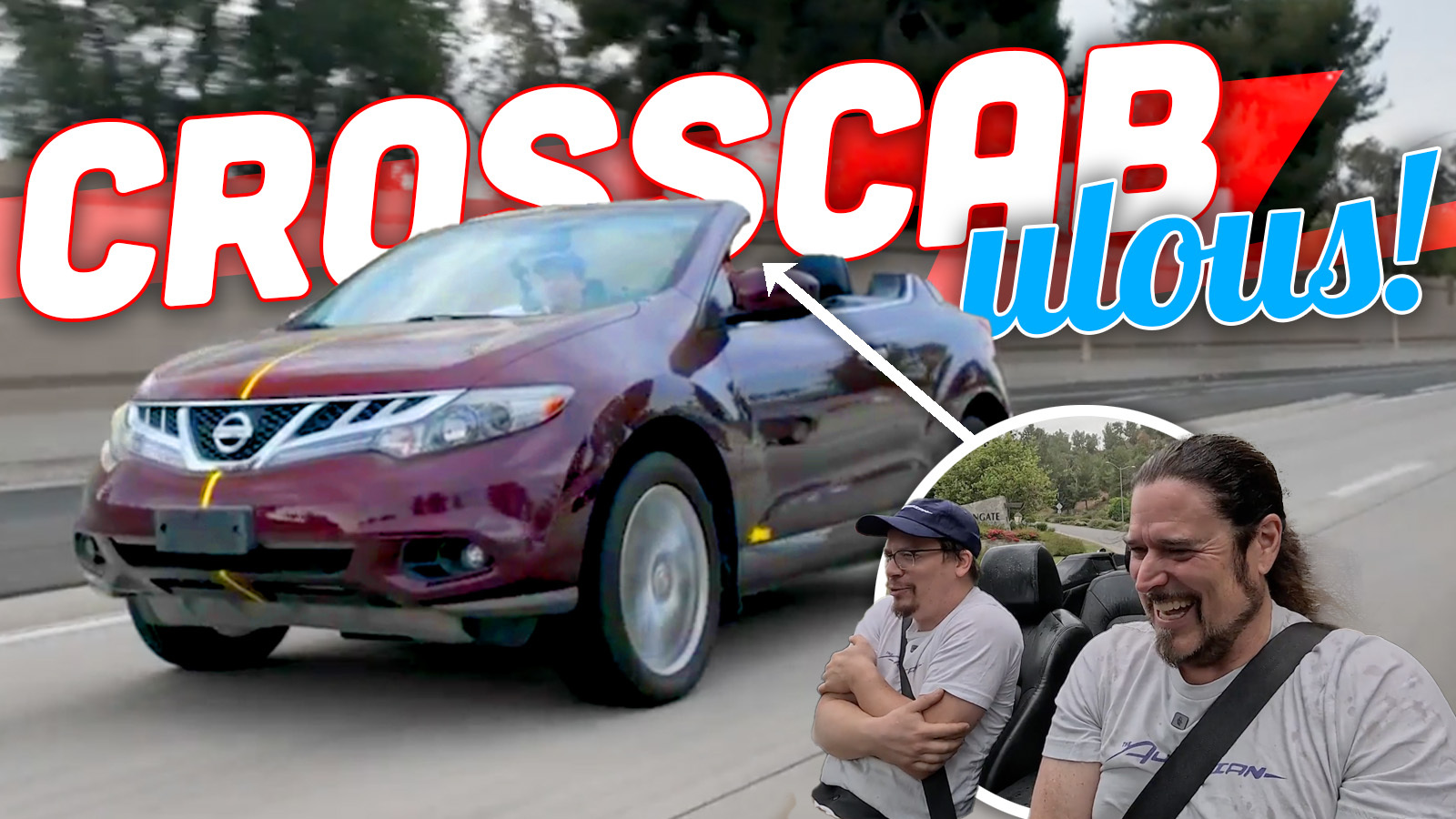You may recall back in April I wrote about the remarkable pop-up foglamps on the Ferrari 365 California, and I also took a moment to show you something else remarkable about the Ferrari 365 California, something taillight related: for a car that has only 14 examples built, I was shocked to discover that there appeared to be at least three different kinds of taillight designs used on the car. Well, my most recent trip to Monterey Car Week showed me something about these taillights that I didn’t know: there’s not just three designs.
There’s four.
Yes, that’s right, among the 14 cars that Ferrari built, there are at least four different taillight variants, and I think there’s a good chance of a theoretical fifth one. Keep in mind, these cars were all built over the course of one year, from 1966 to 1967, which makes this level of taillight indecision a record for the automotive world, I believe.
Here were the three I noted earlier this year:

So, let’s go over the main components of the 365’s taillights: there’s a lower rectangular panel, in either red or clear lens plastic, that houses three parts-bin round lamps, two either red or one red and one amber, and if one of each, there are two positions, with amber either on the outside or middle position.
The final lens is a combination reverse lamp and red retro-reflector, and is always on the end, from the side of the car. Above this assembly is a shaped lens, one that I thought only appeared in amber, to act as a turn indicator, or red, to act as a brake or taillight. Or so I thought. Because this year, at the RM/Sotheby’s auction, lot number 358 was this 1967 Ferrari 365 California Spyder by Pininfarina, and that car had taillights that looked like this:

Oh my. What am I looking at? (breathes into bag) Stay frosty, Jayjay, let’s just all stay calm. What we’re looking at here is yet another taillight variant for the Ferrari 365 California! How is this possible? This version has an as-yet-unseen lower panel with a clear/white backing lens and two red lamps and one clear/white and red reflector reverse lamp, topped by a shaped clear/white lens!
What the hell? Is that big lens a huge extra reverse lamp? That seems unlikely? It may just be decorative, but, still this is astonishing.
After seeing this, I’m wondering if there’s a hypothetical fifth taillight that would just be composed of the lower panel and three round lamps, because that should be theoretically possible, and has a sort of precedent on the similarly-styled 1967 Ferrari 330 GTC Pininfarina Speciale:

That’s not a 365, but I wouldn’t be surprised to see it on one at this point!
So, let’s just recap the math on these cars: 14 cars made, four confirmed different taillight variations. That comes to a different taillight for every 3.5 cars!
We’ve seen before how Monterey Car Week is an excellent place to learn important new automotive lighting-related shockers; remember this?
I’m not saying this realization is as big as the First Indicators discovery, but it’s still fascinating. I wonder how many more variants are out there?








To quote the ever-quotable Captain Jean-Luc Picard then…
https://media3.giphy.com/media/69rOXF4YTDVDD6cwkt/giphy.gif?cid=6c09b952c89ltqvlvx8yig47ul5otubtssrxm9ouind3ijm9&ep=v1_internal_gif_by_id&rid=giphy.gif&ct=g
(“There are four lights!”)
Beat me to it. Strong work!
Ah, the sort of taillight content we expect from The Autopian! My guess is either they used whatever was on the shelf at the Italian version of Autozone or they were deliberately experimenting. With the nature of 60s Italian coach building either explanation is plausible, as is the quantity of grappa consumed at lunch influencing part selection. I wouldn’t be surprised if one was built with mismatched taillights
In addition to being consistently ugly but in an inconsistent fashion, I can’t imagine those partially occluded reverse lamps putting out anything close to a useful amount of light.
I am glad you found a new taillight mystery Jayjay! Finally another taillight post!
Hey Jason… I found another variation here… with NO round lights:
https://mycarquest.com/wp-content/uploads/2017/06/ferrari20196720365_california-3.jpg
https://mycarquest.com/2017/06/ferrari-365gt-california-spyder.html
Well that cracked the code on the “driving lights” too!
I was about to post that.
“So, let’s just recap the math on these cars: 14 cars made, four confirmed different taillight variations. That comes to a different taillight for every 3.5 cars!”
Well OBVIOUSLY Ferrari was just concerned with keeping the design ‘fresh’.
LOL
Maybe less “concern” and more “eh, good enough”.
I remember reading an article years ago about a vintage Ferrari restorer relating the difficulties of working on old Ferraris because the body panels were rarely the same, side to side. Like, the fender peaks were different heights, the vents were in different locations, all because the panels were hand formed back then.
If they couldn’t get the body panels the same on a single car, why should they get the taillights the same from car to car? They probably thought “That’s a whole different automobile. And it’s all the way over there! No one will notice!!”
Little did they know…
I can’t imagine paying $3 million dollars for a car and having to look at those shitty taillights. What a bummer.
Good thing you don’t have to look at the back while you’re driving it!
(an attitude shared by any self-respecting USDM Nissan Cube owners)
British Foreign Minister: What is your report?
Talbot owner: I did not find any evidence that all Americans have guns. I can confirm they are deeply interested in tail lamps.
British Foreign Minister: I see. I shall alert the house of commons.
Talbot owner: Lovely. So this information was valuable?
British Foreign Minister: No. If anything we’re more confused. All we’re trying to do is figure out this thing with lorries and chicken.
The taillights were determined by the customer’s country and their requirements. Source: my butt.
My butt is also the source of many things
Parts bin grab bag. The taillights were industrial units (like most of Ferrari, Alfa Romeo, Maserati, and Lamborghini’s taillights were up until the ’90s) and thus these were likely just thrown together with what they had on hand. If I remember correctly the Lotus Elan 1500/1600/S1 had a similar problem where you had three separate variations — red inner and amber outer, red inner and red outer, and amber inner and red outer. This was due to… Well, being British for one thing. And the other being they just had a ton of taillights taken from big trucks and panel vans they were using. The Elan S2 fixed this by using three taillights and then later switching to single lens units, a change which continued into the S3 and S4.
Maybe each prospective buyer got to sit down with the taillight designer and go over all their options to pick a bespoke taillight as part of the purchasing process. That’s the level of service you expect with a boutique supercar vendor like Ferrari back in the 60s. You just don’t see that level of service anymore and it’s sad, not once did Subaru bring out the taillight consultant and walk me through my options on any of the cars I’ve bought from them!!! Shame.
TBF now you have EBay and Alibaba for your custom lighting needs.
(Also 3D printing if you really want to kick it up a notch)
I’m going to petition the auto industry to replace the term taillights with Torchlights in your honor. Just seems appropriate.
I can’t help but wonder what car these taillamps were originally designed for?
Because Ferrari couldn’t possibly have had a supplier produce just a couple taillamps of each configuration…?
Sure they could. Same mold, different color. Definitely plausible, especially with Ferrari money.
Ferrari to supplier(s):
“Send us samples of five different color lenses. Three of each combination.”
Doing the math – one got broken, thus limiting the production run to 14
Perhaps Ferrari’s customers kept telling them the taillight designs were ugly so they kept at it – unsuccessfully.
If there’s a new taillight every 3.5 cars, that leads to the natural conclusion that every third car had two different taillight styles.
That works as an average if we assume they returned to one of the first three designs starting with the second half of car #12, otherwise it should be every fourth car.